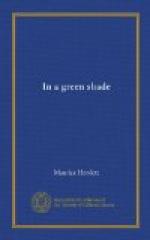pretty emerald ring, which he begg’d me to wear,
to bind still stronger the tie of Brotherhood which
he has always claim’d. In the midst
of all this he brought me a message from Sheridan.”
This, which she describes as a “well-timed Petition
for Forgiveness,” she had the prudence to wave
aside. She said that she had no wish to injure
him, and only asked him to keep out of her way, or,
if they happened to meet, to cease to persecute her.
And that was very well, or would have been so, if
she had had any character at all, a quality which
she unfortunately had not. In 1807, the following
year, she goes out to spend the evening with her daughter,
Lady Caroline, now married to William Lamb. “The
entrance is, you know, very dark; to my dismay, I
saw a ruffian-like looking man following me into the
house. I hasten’d upstairs, but to my great
dismay he also ascended and enter’d the room
immediately after me. It was so dark I could
not at first make out who he was. When I did,
I was not the better pleas’d with his establishing
himself and passing the whole evening with us; but
much as I was displeased with him, I was still more
so with myself for being unable to resist laughing
and appearing entertained (he was so uncommonly clever),
tho’ I persevered in my determination of not
speaking to him. I do not like his having got
the entree there, and think him, even old as he is,
a dangerous acquaintance for Caroline. Of course
you perceive it was Sheridan.” Considering
that she suspected him of having written and sent grossly
indecent letters to that girl of hers, one would have
said that he was even more than a dangerous acquaintance.
Light-mindedness here spills over into something rather
worse. However, there he was, established, and
it was no way to dispossess him to laugh at his jokes.
I must now invite the reader to a farce, and, if he can forget that Sheridan was a grandfather and fifty-six, a very good farce it is. It is 1807, the 28th July. Lady Bessborough is staying with her daughter for her first confinement, and receives a message from Mrs. Sheridan, a rather wild young woman in her way, known to all Devonshire House as Hecca. She goes at midnight,
“... and was carried up to her bedroom, where we had not sat long when a violent burst at the door announc’d the arrival of Sheridan, not perfectly sober. The most ridiculous scene ensued—that is, ridiculous it would have been if I had not felt myself too indignant and disgusted to be entertain’d. He began by asking my pardon, entreating my mercy and compassion, saying that he was a wretch, and was even at that moment more in love with me than with any woman he had ever met with, on which Hecca exclaimed: ’Not excepting me? Why, you always tell me that I am the only woman you were ever in love with.’ ’So you are, to be sure, my dear Hecca; you know that, of course—you know that I love you better than anything on earth.’ ‘Except her!’ ’Pish,




